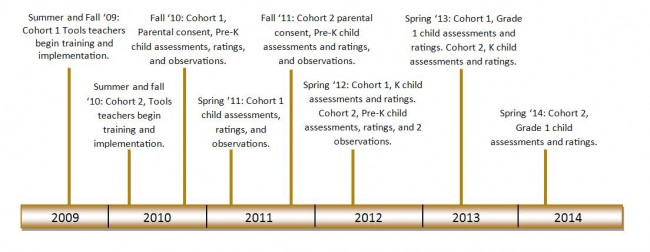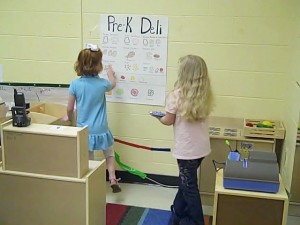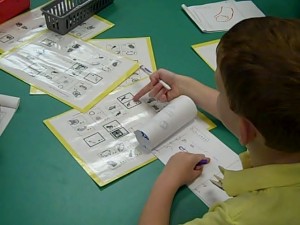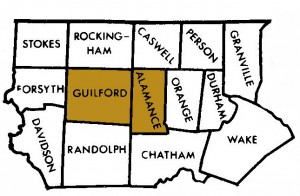Description of Project
The Experimental Evaluation of the Tools of the Mind Pre-K Curriculum study was designed to compare the effectiveness of the Tools of the Mind (Tools) curriculum to the curricula the school system was using (when the study began) at enhancing children’s self-regulation skills and their academic preparation for kindergarten. In addition, we tracked and compared the effectiveness of each into first grade. The research plan in 2010-11 (cohort 1) and 2011-12 (cohort 2) involved assessing the consented children in both Tools and Comparison classrooms at the beginning and end of the pre-k and then again at the end of kindergarten and first grade using a variety of self-regulation tasks and child achievement measures. Each classroom was observed three times during the pre-k year using multiple measures designed to capture the differences between classrooms using Tools and those using other curricula.
Four school systems in Tennessee and two in North Carolina agreed to partner with us to conduct this first experimental evaluation of the Tools of the Mind curriculum.
Participants
The Experimental Evaluation of the Tools of the Mind Pre-K Curriculum project is fortunate to have participants from Franklin Special School District, Lebanon Special School District, Wilson County School District, and Cannon County School District in Tennessee as well as Guilford County School System and Alamance-Burlington School System in North Carolina.
Cohort 1 (TN and Guilford, SY 2010-11)
- Children were from 60 classrooms (Tools = 32) in 45 schools (Tools = 25).
Cohort 2 (Alamance-Burlington, SY 2011-12)
- Children were from 20 classrooms (Tools = 10) in 12 schools (Tools = 5).
Tennessee:
Timeline
Below is the timeline for the Experimental Evaluation of the Tools of the Mind Pre-K Curriculum project. This timeline shows the assessments, behavioral ratings, and classroom observations that students and teachers participated in for both cohorts 1 & 2.





©2024 Vanderbilt University · This research study is being funded by a grant from the US Department of Education Institute of Education Sciences (Grant R305E090009). Drs. Dale Farran, Mark Lipsey and Sandra Wilson of the Peabody Research Institute at Vanderbilt University are conducting this five-year study. Training and coaching support for Tools of the Mind was funded through a sub-award to each of the developers, Dr. Deborah Leong and Dr. Elena Bodrova,Tools of the Mind Third Sector New England (TSNE).
Site Development: University Web Communications